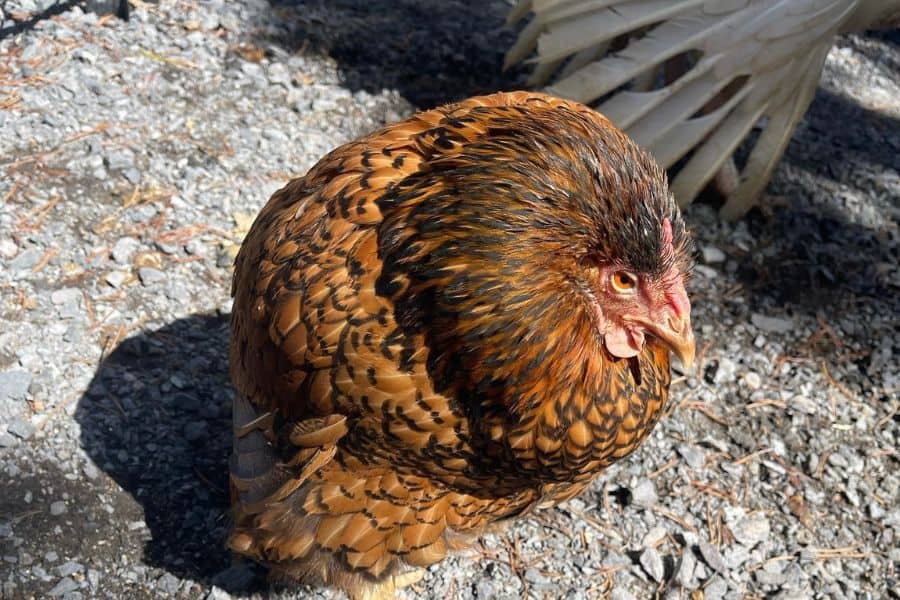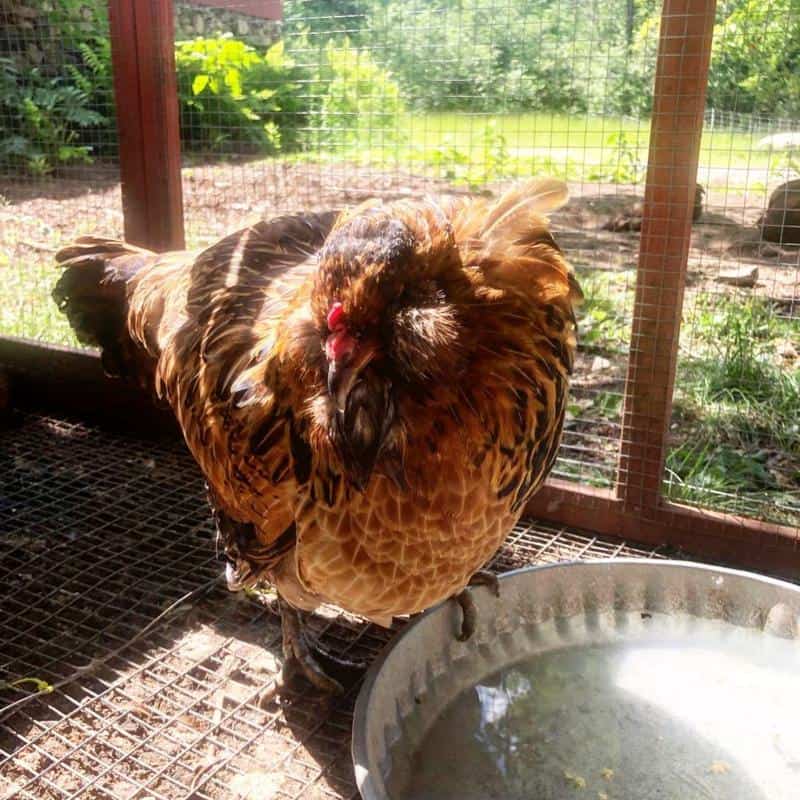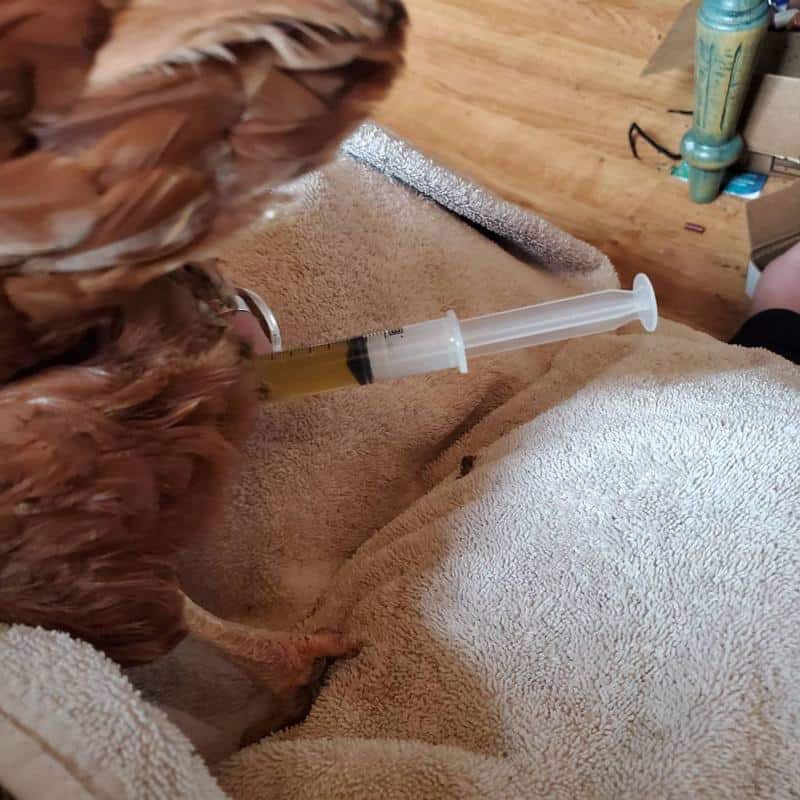Chicken water belly is characterized by the accumulation of fluid in the abdomens of chickens. The clinical name for this condition is ascites and it is usually a symptom of a serious underlying problem.
Incidences of ascites have become more prevalent in recent years and affect poultry farms in many parts of the world. Depending on the specific cause of the issue, it could be an isolated matter, or it could be a sign that your entire flock is at risk.

In some cases, there is little a farmer can do to prevent the occurrence of chicken water belly in some of their birds. However, some of the risk factors that contribute to this condition are known and can be kept in check.
Read on to find out how to identify chicken water belly in your birds, the issues that cause it, and how to prevent it from ravaging your flock.
What is Chicken Water Belly or Ascites?
A chicken is said to suffer from water belly when it has a non-inflammatory fluid accumulating in its abdomen. This condition goes by several names including ascites and pulmonary hypertension syndrome.
Ascites is usually the result of complications caused by a higher-than-normal blood pressure between the lungs and the heart. This abnormal blood pressure can cause:
- Higher blood pressure in veins
- Heart failure
- Degeneration of blood vessels resulting in leakage of plasma into the abdomen.
- Fluid buildup in the liver which later leaks into the abdomen.
The leakage of fluid comes later and usually indicates that the underlying issues have reached an advanced stage.
The higher-than-normal blood pressure can be caused by any condition or situation that causes excessive amounts of blood to flow through the chicken’s lungs. It can also arise when blood encounters more resistance as it flows through the lungs.
Ascites can also be caused by liver damage without any other heart issues in the chicken.
Ascites is not an infectious condition, fortunately. This means that it’s not a condition that’s going to spread through your flock from one sick bird.
Risk Factors of Chicken Water Belly
As stated earlier, any issue that increases the blood pressure between the chicken’s lungs and heart can trigger ascites in your chickens. This list is unfortunately long and may include:
- Chickens growing at a faster-than-normal rate
- Lung disease
- Heart disease
- High altitudes
- Very cold weather
- Long heat waves
- Old age
Some chickens are also said to be genetically predisposed to this condition. This is despite breeding companies’ efforts to strengthen their stocks against this condition.
How Does Chicken Water Belly Actually Happen?
The above risk factors contribute to either more blood getting pumped through the lungs or blood finding it harder to move through the lungs. In either case, the heart is forced to work harder to pump blood.
This extra demand on the heart causes it to become enlarged. This results in worse pumping efficiency and blood headed back to the heart doesn’t all make it there.
The pressure of blood in the veins increases and some of the chicken’s blood vessels become damaged. This results in fluid leakage into the abdomen.
The chicken’s liver is also affected early due to its role in the body, and it becomes overloaded resulting in leakage of fluid into the abdominal cavity.
Symptoms of Chicken Water Belly

The noticeable water belly is just one of multiple symptoms that can be used to diagnose ascites. In addition to the accumulation of fluid in the abdomen, a chicken with ascites may show symptoms such as:
- Being smaller compared to birds of similar age. This is because the underlying conditions can interfere with the growth of the bird.
- Heavy breathing or panting. Some afflicted chickens will breathe with their beaks open.
- Reduced levels of activity
- Depression
- Very low heart rate
- Wattles and comb turning blue.
A post-mortem examination can also reveal if a chicken died from ascites. Such an examination may reveal:
- Some quantity of clear yellow fluid in the abdomen
- Enlarged liver which may be firm to the touch due to fluid buildup.
- Shrunken liver.
- Fibrin deposits on the surface of the liver.
- The outer heart surface may be inflamed.
- Heart may be enlarged on the right side.
- Congested lungs
How is Water Belly Treated?
Presently, once ascites has developed, it has no cure and any treatment administered is a short-term measure.
One treatment that is said to offer short-term relief by some farmers is draining of the fluid that has accumulated in the abdomen of the chicken. This can be done using a syringe and a needle as demonstrated in the video below.
It’s not advisable to drain all the fluid at once as it can lead to shock. This draining is repeated from time to time as the fluid continues to drain into the chicken’s abdomen.
How Long Can a Chicken with Water Belly Survive?
There is no exact time frame for how long chickens can survive once they develop water belly. Some owners have reported that their chickens have lived on for around 6 months after developing the condition.
However, since the underlying conditions are not treated, the condition of the chicken will likely continue to deteriorate. Culling the chickens may be the best option so as not to prolong their suffering.
Also Read: Humane Ways to Euthanize a Chicken
Ascites Syndrome and Ascites in Broilers
Modern commercial broilers are several times larger than they were back in the 50s. The composition of their bodies has also undergone significant changes.
As a result of these changes, the internal organs of these chickens can struggle to meet the demands of their bodies. During the periods with the highest growth rates, the oxygen demand is much higher, and this can cause right heart failure.
Right heart failure is also known as ascites syndrome. Ascites Syndrome usually results in ascites, i.e., water belly. However, some chickens with this syndrome will die before ascites develops.
Ascites syndrome affects more than 2 percent of broiler populations in some cases. Your flock may be at higher risk of ascites syndrome and water belly if:
- Your farm is located at a high altitude because there’s less oxygen there.
- Your chickens are exposed to cold weather as chickens’ metabolisms increase to generate more internal heat.
- Your birds are exposed to poor air quality e.g., high levels of carbon dioxide, carbon monoxide, or ammonia.
Chickens that die due to Ascites Syndrome are usually aged 5 weeks or older. However, some younger broilers may also develop this problem if they suffer from lung disease or have too much sodium in their diet.
Ascites Syndrome is more prevalent in male broilers compared to females. Chickens that have passed from this condition are usually found lying on their backs.
Prevention of Chicken Water Belly

It’s not possible to guarantee that ascites will not affect some of your chickens at some point. However, there are steps you can take to lower the possibility of this issue arising.
Controlled Feeding
It has been established that abnormally fast growth in chickens can result in ascites due to the increased metabolic demands of a bigger body. This fast growth can be slowed down by:
- Feeding the chickens less often.
- Using a less energy-dense feed.
- Decreasing the hours of daylight in the coop.
Monitoring Sodium Intake
High sodium levels can contribute to ascites syndrome by increasing the volume of the blood and causing the constriction of the arterioles. This can be prevented by monitoring and limiting the amount of sodium in the food and water consumed by your chickens.
You should have the water given to your chickens tested regularly and keep samples of feed. This will make it possible to test them later if there is a need.
Altitude
Unfortunately, there is no simple solution to the altitude problem and its contribution to the underlying conditions that lead to ascites. When raising chickens at altitudes exceeding 900m or 3000 feet, the growth of broilers must be slowed to prevent ascites syndrome.
Other experts recommend not taking your chickens above 1500m (4921 feet).
Improving Air Quality
The presence of ammonia and other gases can also cause health problems that result in ascites. The easiest way to prevent this is by ensuring your chickens’ house is well-ventilated.
Additionally, the chickens’ coop and surroundings should be cleaned regularly to prevent the growth of mold and bacteria that can cause respiratory infections. Each chicken should also have plenty of space for itself.
Temperature Control
Cold weather is a risk factor because it forces the birds to generate more body heat hence require more oxygen. If a broiler chick is briefly exposed to cold weather during its first few weeks, it will be at greater risk of developing ascites syndrome compared to other chicks.
The only way of preventing this is by taking measures to protect your chickens from chills. You should also monitor the temperatures in the birdhouse regularly just in case.
Genetic Selection
Many chickens that suffer from ascites syndrome are genetically predisposed to suffer from pulmonary hypertension. It is now possible to select broilers based on their predisposition to this issue and this can lower the occurrence of ascites in your flock.
Also Read:
Final Thoughts
Chicken water belly is a condition that has no cure, and this can be disheartening. Additionally, it can cause the last few weeks or months of your bird to be rather miserable.
Water belly or ascites is the result of a series of events that start with too much blood pressure between the chicken’s lungs and heart followed by heart and liver failure.
Draining the fluid that accumulates in the chicken’s abdomen is said to alleviate the stress, but this is usually a temporary solution. Boiler chickens are at higher risk of ascites syndrome and ascites due to their high growth rates.
Although it has no cure, there are measures that can be taken to lower the risk of your chickens being afflicted with this condition. These measures include controlled feeding and improved air quality to genetically selecting birds that are less likely to suffer heart failure.
